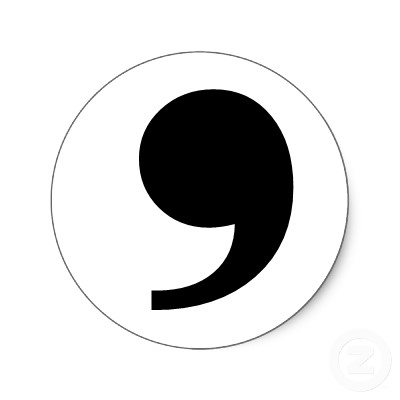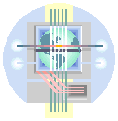
Instructional Materials for
Craig White's Literature Courses
|
|
Punctuation: introduction & overview |
Problem: All normal people speak their native language well enough, but when they write, many feel challenged by punctuation.
Punctuation errors are sometimes identified as "problems with grammar," but people usually speak grammatically and easily understand how words work together to express meaning, or which word goes before or after another word. Listeners using the same language can process what's being said. Everyone's speech gets tangled up sometimes, but if people keep talking, they usually figure out how to say what they mean.
Yet people who speak with natural ease and competence often lose confidence when writing, especially when punctuating. Why?
![]()
Background analysis: Speaking is far more common and natural than writing. Nearly everyone talks more than they write and find normal conversation easier than writing.
Humans' biological evolution as social creatures is inseparable from language, which we and our ancestors have been speaking for hundreds of thousands of years. Even the simplest societies need language to function. Aside from food and shelter, language acquisition (parents or family teaching, children learning) may be the most essential requirement for human development. Evolution programs humans to speak with each other. People who master language have a better chance of surviving and reproducing.
Writing developed only in the past few thousand years. It is not so much basic human nature—many people even today live their lives without ever reading and writing. Instead, writing is more a product of cultural evolution and a requirement for living in a large, complex civilization. Until the past few centuries most people never learned to read or write, or even saw much writing as part of their daily lives. Even in advanced societies, writing was often reserved for priests, clerks, and scholars. Most farmers, warriors, tradespeople, even rulers kept few records or accounts of their own. Like nearly everyone today, what they knew of the world they mostly learned from what other people said (or what they heard themselves saying).
Yet writing, like speech, is a form of language, and punctuation is part of how we record and develop our spoken language in another medium—the medium of writing rather than speech. Nearly anyone who can speak can learn to read and write, but even today many people get by with little reading and writing. Therefore writing can feel specialized or elitist, especially since it is often associated with privileged classes. To people uncomfortable with writing, punctuation often appears like a secret code you're expected to know but few really understand—and you can be punished for violating this elite code!
![]()
Solution + attitude adjustment: Like all language, punctuation constantly evolves to meet changing needs. Instead of developing naturally among all speakers, though, rules or guidelines of punctuation develop among a comparatively limited class including educators and writers. (Despite such differences, all classes of people speak more or less the same language, though with differences of diction and syntactic complexity.)
Since most people are naturally stronger in spoken language than in writing and punctuation, one helpful approach is to use our common sense with spoken language to make sense of punctuation.
With one important exception, you can use your sense of the sound of language to hear punctuation. The benefit of this approach is that correct and inventive use of punctuation can enhance or refine the sound of your writing.
Put another way, punctuation and other mechanics cue your reader how to process words on a page without the benefit of hearing your voice's pauses, tonal changes, cadence, etc.
As an analogy, punctuation accompanies words and sentences as musical notes accompany the lyrics to a song. Punctuation may affect rhythm, pitch, and meaning.
![]()
Most obvious or emphatic examples of punctuation as sound: the question mark (?) and the exclamation point (!).
A question mark cues the voice to rise in pitch:
-
"Are you my ride home?"
-
"What should I do?"
An exclamation point signals emphasis, volume, speed, or urgency:
-
"Get away from me!"
-
"You're out!"
![]()
The sounds of other punctuation marks are less obvious but still perceptible:
A period voices a full stop at the end of a complete sentence:
-
"I can't take another step.Go on without me."
A comma indicates a pause or division, sometimes with a breath or a shift in tone:
-
"Yesterday was her brother's birthday, so she took him out to dinner."
-
"The Constitution establishes the legislative, executive, and judicial branches of government."
A semicolon indicates balance or parallel structure between the phrases or clauses it connects:
-
"Some people write with a word processor; others write with a pen or pencil."
-
"Everything about our sessions pleased me: the smallness of the room; the noise of the janitor's broom hitting the edge of the long hallway outside the door; the green of the sun, lighting the wall; and the old woman's face blurred white with a beard."
A colon comes to a full stop like a period, but also implies something to follow (which may be a list but doesn't have to be):
-
"One factor cannot be ignored: the bottom line."
-
"There are three countries in North America: Mexico, the USA, and Canada."
![]()
The one great EXCEPTION to hearing punctuation: the apostrophe, which gives no sound or aural signal.
For instance, the first three words of these two sentences have different meanings but sound exactly the same:
-
The girls bike to the store and back.
-
The girl's bike had a flat tire.
You cannot hear the difference in the sounds of the words. You can only see the difference. In normal out-loud speech, the context would appear quickly enough to avoid the problem. Since writing involves so much more cognitive labor, the apostrophe clarifies the meaning without generating confusion and frustration.
The apostrophe's exception to punctuation-as-sound proves the rule, because the apostrophe is the single form of punctuation that people have the most difficulty remembering. In a hurry, even your hyper-literate professor sometimes writes "you're" for "your."
In sum, we can more or less remember and master other forms of punctuation because we can hear them, but the apostrophe is the most troublesome form of punctuation simply because we cannot hear it.
![]()
|
Progressive attitudes toward punctuation: |
Phase 1. Ignorance, fear, suspicion, shut-down, avoidance. Punctuation marks are like snakes—you can't tell the difference between them, and if you get close enough to learn, you might get bit, so just shut your mind and bang your way through any writing task in hopes that your classmates (maybe even your teacher) are as clueless and desperate as yourself.
-
Upside: You get to relax and stop thinking—always a temptation in academic life—plus indulge a smug sense of superiority to people who fret over such issues (and may themselves act smug and superior).
-
Risk: Your reader may interpret your ignorance of standard writing mechanics as general ignorance or indifference.
Phase 2. Learn, observe, and practice rules or conventions of standard punctuation. (Convention = "rule or practice based on general consent, or accepted and upheld by society at large")
-
Upside: Knowledge is good! "Rules" can be a starting-point for any writing decision.
-
Risk(s): You might assume the rules you learned are valid forever and in all cases, to the extent that you twist or warp your language to fit the rules. If you're an editor or teacher, you might punish people who appear to break the rules but are simply developing new practices for the living language-world.
Phase 3. Know, respect, and generally practice or observe the rules but learn to bend or break them to meet new needs.
-
Upside: Knowledge grows and refines through application. You learn to write by writing. Rules become guidelines that can be adjusted to the task at hand.
-
Risk(s): Some experiments will succeed while others fail Accept failure as another opportunity to learn. To paraphrase Francis Bacon, Error is preferable to ignorance.)
The most common risk of evolutionary thinking is assuming that evolution means change only, and thus knowledge of rules or conventions isn't necessary because everything always changes. Think of evolution like transition: continuity + change; our present work mediating past and future. The new grows from the old, and the old lives in the new.



